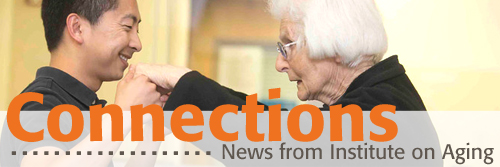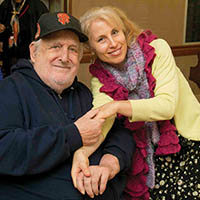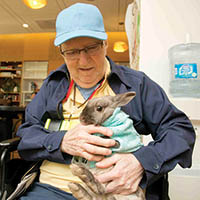Smart Slider 2 – widget
Newsletter October 2013

Letter from the President
Connect. Dignity. Independence. Assurance.
These are the cornerstone messages of our new media campaign launched in September. After forty years as a recognized expert in the field of aging, Institute on Aging is broadcasting exciting developments in the pioneering services and programs we offer to Bay Area seniors. Even our new logo is designed to capture the spirit of Institute on Aging and to advance and broaden our outreach. Read More
The Hidden Crime
Elder abuse is often a hidden crime and chronically under-reported, but with the support of the public, we can change that. Elder abuse comes in many forms: financial, physical, psychological, sexual and neglect. The most recent research now shows that across the nation, 5 million elders—one in ten—are abused every year. Unfortunately, 79-year old Anna was one of them. Read More
Value of Social Care
While medical advances have extended average lifespans and improved the quality of life experienced by older adults, it is increasingly apparent that social care plays a crucial role in supporting seniors’ sense of well-being. But what is social care, exactly? Read More
Bunny Comfort Care
Most people envision a friendly pup when they hear about the virtues of pet therapy, not a rabbit. But rabbits are soft, vulnerable pets that offer unconditional love—and make people happy. Take a visit to Institute on Aging’s Adult Day Programs during the week and you might just be lucky enough to visit with Pancakes, our very own certified pet therapy rabbit. Read More
Letter from the President
Connect. Dignity. Independence. Assurance.

These are the cornerstone messages of our new media campaign launched in September. After forty years as a recognized expert in the field of aging, Institute on Aging is broadcasting exciting developments in the pioneering services and programs we offer to Bay Area seniors. Even our new logo is designed to capture the spirit of Institute on Aging and to advance and broaden our outreach.
Over the years, Institute on Aging has continued to add layers of expertise and assistance to our community. The innermost band of color in our logo reflects our strong and firmly established community roots in Mount Zion Hospital. The white opening in our logo lets us know that there is always room to expand, to be better, and to serve more people.
The logo’s external band of color also reflects the support services we provide to maintain and restore independence and to protect personal dignity. The interior band of white symbolizes the personalized, innovative approaches to care we provide for individuals and their families.
The logo is a visual symbol of assurance and reliability, which is what Institute on Aging stands for. Our logo and campaign might be new, but our message of aging in place and with dignity remains the same.

J. Thomas Briody, MHSc
President and CEO
The Hidden Crime
Elder abuse is often a hidden crime and chronically under-reported, but with the support of the public, we can change that. Elder abuse comes in many forms: financial, physical, psychological, sexual and neglect. The most recent research now shows that across the nation, 5 million elders—one in ten—are abused every year. Unfortunately, 79-year old Anna was one of them.
Anna lived in a modest home that was filled with memories of the life she shared with her late husband. Business suits still packed the bedroom closet and ‘Niners memorabilia lined the fireplace mantle. When dishes stayed unwashed and laundry continued to pile up, Anna’s daughter Elyse took it upon herself to move in and care for her aging mother.
As months passed, neighbors became aware that they hadn’t seen Anna in a while. After several attempts to visit their friend resulted in being abruptly turned away at the door by Elyse, the neighbors became suspicious and called Adult Protective Services (APS). While the house initially appeared to be decently furnished and fairly tidy, what APS staffers found in the back bedroom was horrifying. Anna appeared emaciated and dehydrated, and was uncontrollably shivering and obviously ill. In the dead of winter, she had been left in a room that was unheated with a window left ajar. The social worker immediately called 911 and Anna was taken to the hospital.
Elder abuse and neglect is a complicated problem requiring a multi-disciplinary response from physicians, mental health professionals, social workers, law enforcement, and various city agencies. Back in 1981, Institute on Aging was a trailblazer in launching the first collaborative team that could offer an effective, multidisciplinary response to abuse cases. As one of the founders of the San Francisco Forensic Center in 2008, Institute on Aging’s Elder Abuse Prevention program and psychological assessment services provide leadership and guidance to other professionals and agencies that serve aging and dependent adults in the Bay Area.
In Anna’s case, our timing couldn’t have been better. Her case was presented to the Forensic Center team, who worked to create an intervention plan. A police report was made and a restraining order was obtained against the daughter. During Anna’s hospital stay the team visited Anna regularly to bolster her spirits. Upon her release from the hospital, Anna was placed anonymously and temporarily in a skilled nursing facility for her protection. Before too long, further arrangements were made by Institute on Aging to place Anna back into the community. Today Anna is able to live independently, in a safe and secure environment.
You don’t need proof of abuse to make a report; you just need to suspect that abuse is occurring and care enough to make a phone call. Join Institute on Aging in making San Francisco a safer place to age by learning more about elder abuse and ways to support our Elder Abuse Prevention program.
Connect with us today. Website: www.ioaging.org Elder Abuse Prevention on Twitter: https://twitter.com/EndElderAbuse Facebook page: www.facebook.com/IOASFBAY
Value of Social Care
While medical advances have extended average lifespans and improved the quality of life experienced by older adults, it is increasingly apparent that social care plays a crucial role in supporting seniors’ sense of well-being. But what is social care, exactly?
Social care provides the emotional and social support for older adults to lead independent lives as they age. By providing care management, psychological services, housekeeping, meal preparation, and multiple other services, Institute on Aging ensures that people get the help they need to live independently. At a time when the number of people past retirement age is growing faster than at any other point in history, the value of social care is an increasingly critical component in the continuum of care offered to seniors.
Traditionally, health care has focused on managing the medical needs of a patient—sometimes neglecting the other factors that play a role in whether or not a person adheres to a treatment plan. But since your health doesn’t start when you enter the doctor’s office nor ends after the appointment, neither should your care. Without adequate social care, many older people report increased loneliness and isolation, which often times results in unnecessary hospital admissions that cause unnecessary distress and financial burdens for the older person and those who love them.
Institute on Aging makes it possible for older adults and adults with disabilities to have the support they need to ensure that their needs
are being met.
Bunny Comfort Care
Most people envision a friendly pup when they hear about the virtues of pet therapy, not a rabbit. But rabbits are soft, vulnerable pets that offer unconditional love—and make people happy. Take a visit to Institute on Aging’s Adult Day Programs during the week and you might just be lucky enough to visit with Pancakes, our very own certified pet therapy rabbit.
Pancakes has been a wonderful addition to the Institute, stirring up fond memories of old pets and recollections of childhood, and helping to de-stress clients. Pancake’s calming and soothing presence brings joy and delight to all who affectionately stroke his fur and lovingly hug him. As one staff member puts it, “Animals are just amazing that way; they’re beacons of light, brightening peoples’ day. Simply put, our clients love Pancakes and he loves them.”
The visiting bunny has become such a main fixture at our programs that often the first question out of a client’s mouth is “Where is Pancakes?” Often times clients save baby carrots from meals just to be able to feed him later! One client specifically plants lettuce in the garden outside the day center for Pancakes.
But Pancakes is far more than a cuddly diversion; he has changed lives. Sam, whom often had difficulty communicating, used to become very agitated and angry. But that was all before he was introduced to Pancakes. Over time, as his visits with the rabbit grew longer and more playful, Sam’s anger started to subside. Eventually Sam would sit contently for hours on end just stroking Pancakes saying “I love the bunny,” and occasionally break into ear-to-ear smiles.
Anthony, always had trouble with his blood pressure, but he swears that Pancakes (whom he has affectionately re-named “Cupcakes”) is the best medicine ever. Extremely anxious and frequently tense, Anthony turns to Pancakes when he feels his blood pressure rising. Listen closely enough while he’s gently patting Pancakes, and you can hear him praising “Cupcakes” for making his blood pressure go down.
Pancakes, might not be the most vocal member at Institute on Aging, but his presence is leaving quite an impact on older adults and other members of our community. Sam and Anthony and so many other clients who respond to Pancakes with love provide real proof that rabbits might just be the next best thing in pet therapy.

